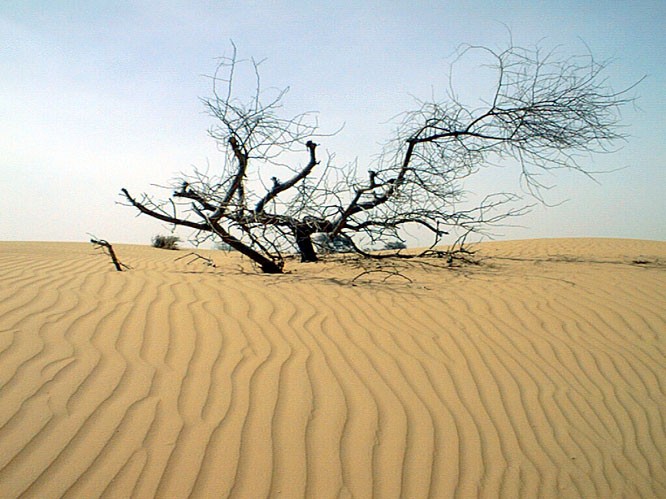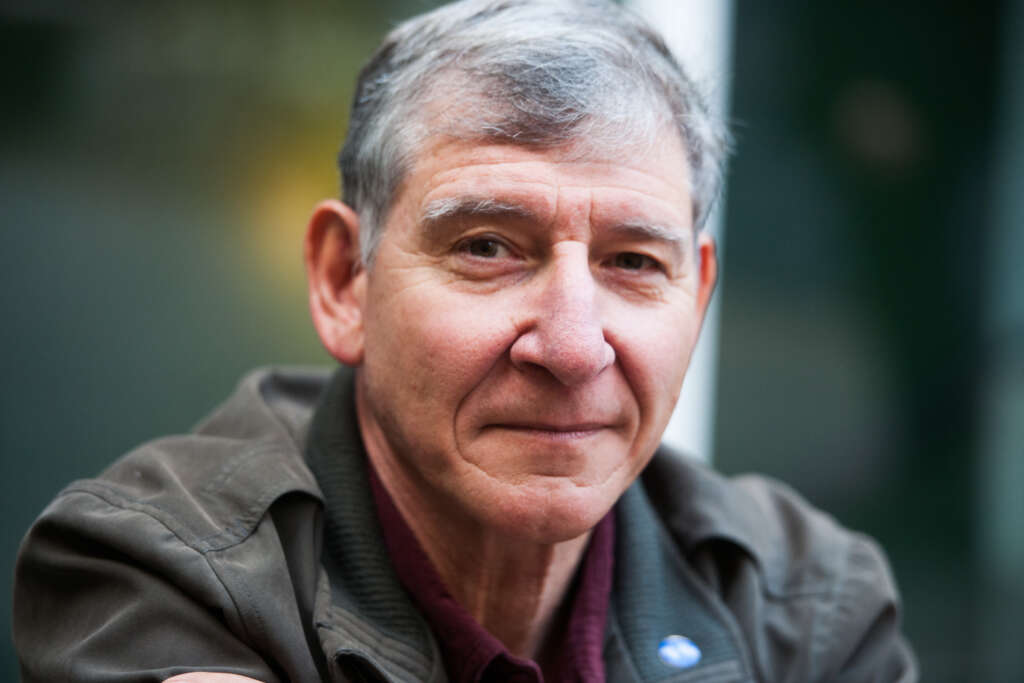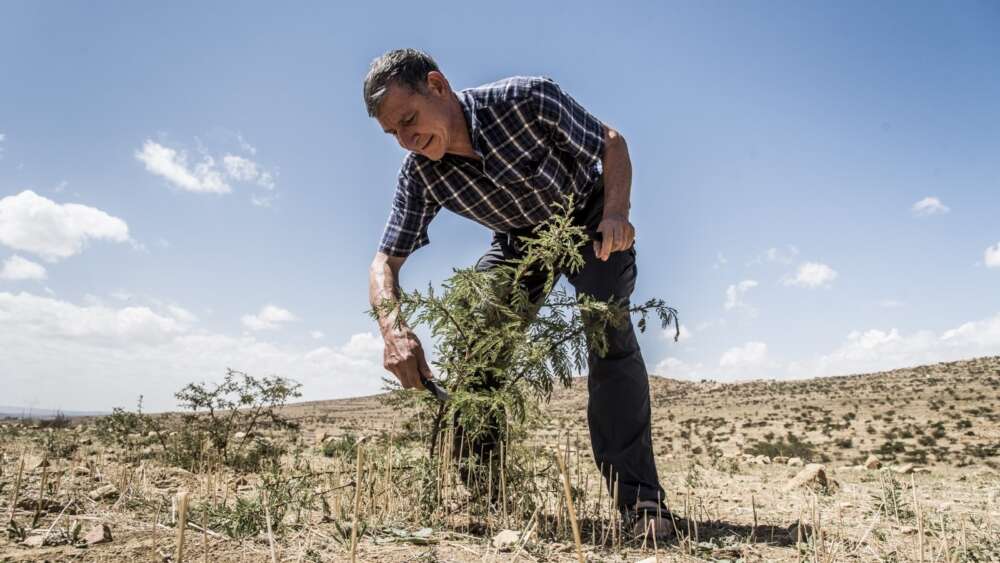Forest maker urges NT teachers to ‘make hope happen’
Tony Rinaudo’s incredible testimony about relying on God, changing community mindsets, and the regeneration of hope
Tony Rinaudo, known as the Forest Maker, has challenged Christian teachers in the Northern Territory to “make hope happen” by their actions and “never give up” because God does answer prayer.
World Vision’s Principal Climate Action Adviser told a conference of NT Christian Schools of the many setbacks and moments of despair he faced in his long campaign to re-green deforested areas of Africa when he wondered if God really cared.
Rinaudo was the keynote speaker at NT Christian Schools’ annual ‘Over the Top’ conference of more than 240 teachers and staff. This year, the conference theme was ‘Grow’.

Because of massive deforestation and climate change, Niger’s landscape was barely able to support life on Earth in the early 1980s.
He told the conference how his faith was greatly challenged in 1983 when faced with possible failure of his experimental Farmer Managed Natural Regeneration (FMNT) project – in which stumps of trees that had been cut down were allowed to grow back strongly with pruning and thinning.
“The trees were growing quickly. The farmers were excited about it. And I felt, this is the answer that we were looking for,” he said.
“However, there was a lot of opposition – a lot of fear and suspicion. People started cutting down the trees of these volunteers. In 1983, the whole experiment could have failed, but that same year events beyond our control took over. It didn’t rain that year, people were hungry, they were starting to leave home, and it changed everything.”
“Everything that I needed was literally at my feet.”
By this stage, Rinaudo and his wife Liz had lived in Niger for two-and-a-half years. When they arrived, the landscape had been on the point of collapse with devastating hunger brought on by drought and deforestation.
After several failed experiments with tree planting, Rinaudo had been on the point of quitting when he sent up a desperate prayer that God would show him what to do. God had answered that prayer dramatically by showing him leaves on a living tree stump when he was on a bush track.
“In that instant, everything changed for me. I was no longer fighting the Sahara Desert. It wasn’t a question of having some massive budget or a miracle species of tree that could withstand goats and drought and so on. Everything that I needed was literally at my feet. And I knew from my travels across the country that there were millions of these living tree stumps strewn across that landscape.”
However, the real problem proved not to be a technical one of how to get trees back into the landscape so much as a social problem of convincing farmers of the value of leaving trees on their valuable farmland when they were already hungry.
 When people in the local villages started to leave home because of the 1983 drought, Rinaudo was devastated. Unlike when he was moved as a child by the thought that children like himself could go to bed hungry, this was personal because it was happening to his friends.
When people in the local villages started to leave home because of the 1983 drought, Rinaudo was devastated. Unlike when he was moved as a child by the thought that children like himself could go to bed hungry, this was personal because it was happening to his friends.
“I received their hospitality and reciprocated when they came to town. And so this time around, the people affected were my friends. And they meant a lot to me, and it affected me very, very deeply. What made the situation harder for me as well, people started camping around our house.
“They would literally sleep on the ground at our doorstep, waiting for me to come out in the morning, pleading for help. So emotionally, it was very, very draining. And at that time, I had no funding. There appeared to be no grain to purchase, even if I did have money … And importantly, we had no permission, no government authorisation to go out and do a program like this. And this weighed very, very heavily on me. I didn’t know what to do.”

Tony Rinaudo Wolfgang Schmidt
One morning, as he was trying to eat breakfast, a lump formed in his throat and tears started to come at the hopelessness of the situation.
“But the Bible was randomly open on the table next to my cereal. And I looked down and it happened to be open on this verse, on this page: ‘Thus says the Lord to you, do not fear or be dismayed because of this great multitude. For the battle is not yours, but God’s.’ [2 Chronicles 20: 15] And immediately – I didn’t know what or when – immediately I knew God was going to do something very dramatic.”
Within a week, the governor of that state passed away, and the mayor of the city, a great friend of the mission, took over. The mayor signed a document straight away allowing FMNT to proceed. Within the next eight months, Christians from around the world sent half a million dollars. Mysteriously, also, grain became available to buy.
“We purchased 1,800 tonnes of grain and were able to help over 30,000 people. In reality, many more people than that were helped because, in Africa, nobody eats alone. They share with family, with neighbours, and so on. So perhaps in excess of 50,000 people benefited from that food.”
“Yes, God does answer prayer. And, surprisingly perhaps, God even uses very ordinary people in extraordinary circumstances like that.”
Rinaudo confessed that around that time, he had wondered: Does God really care? Does God answer prayer? And importantly, does God use very ordinary people in terrible situations like this?
“At the end of that year, I was able to say … Yes, God does care. Yes, God does answer prayer. And, surprisingly perhaps, God even uses very ordinary people in extraordinary circumstances like that.”

Niger before and after forest regeneration.
Rinaudo cleverly engineered the food program into a Food for Work program that required every farmer who wanted grain to regenerate 40 trees per hectare on their agricultural land – to prevent people from repeating the same suffering year after year after year because the root causes weren’t being addressed.
“At the end of that eight-month period, more than 500,000 trees were regenerated across the district that we worked in. Over the following 20 years, the idea of Farmer Managed Natural Regeneration … spread at a rate of a quarter of a million hectares per year for 20 years. And after that period, some five million hectares of farmland were repopulated with over 200 million trees.”
Now a well-known figure whose book The Forest Underground was awarded the Sparklit Australian Christian Book of the Year in 2022, Rinaudo revealed that he had always been plagued with self-doubts.
“I threw out a child’s prayer, simply asking God, ‘Please use me somehow, somewhere to make a difference.’
As a child, he had been angry and frustrated by two major issues: clearing of the bushland he loved so much around his home in northeast Victoria and world hunger.
“Fortunately for me, the third thing that had a big impact on my life was my mum’s strong faith. And it gave me a framework for living and an understanding that there are more important things to life than financial security, that we do have a duty of care for those less fortunate than ourselves. And that as Christians, we have a responsibility to be good stewards of God’s creation … So what to do? I did the only thing I felt I had power to do. I threw out a child’s prayer, simply asking God, ‘Please use me somehow, somewhere to make a difference.’ I’ve tried to be true to that prayer. And I believe God’s honoured that over the years.”
When Rinaudo went to university to study agriculture, he got into the habit of reading the Bible every morning.
“I was never over-endowed with a lot of self-confidence, so I was under a lot of attack at that time, especially with self-doubt. I asked myself, ‘Who do you think you are? What does the boy from country Melbourne think he’ll do? What changes will he make on a world scale?’ And these self-doubts plagued me. But I read in God’s word from Ephesians 2:10: ‘For we are his workmanship, created in Christ Jesus for good works, which God prepared before, that we would walk in them.’”

Tony Rinaudo was awarded the Sparklit Australian Christian Book of the Year in 2022 for The Forest Underground SparkLit Facebook
As he came back to this verse time and again, it gave him great confidence that if he could just muster enough faith to take the next step, he could leave the rest in God’s hands.
Working with World Vision since 1999, Rinaudo says Farmer Managed Natural Regeneration has now been introduced into 29 countries and the idea has spread beyond World Vision too.
In Niger, many farms have been transformed from windswept, barren fields to agroforestry parklands, which are more productive as agricultural land but protected by healthy stands of trees.
“World Vision works in roughly 100 countries around the world. All of them are impacted by deforestation and certainly by climate change to one degree or another. And in the countries where we’ve introduced this, we witness the same benefits, the general rehydration of the landscape, the return of springs and, in some cases, waterfalls; water tables rise or wells are replenished. Where we do this at scale, the return of biodiversity and wildlife have a big impact on people’s livelihoods.”
Rinaudo said on his last visit to Niger in 2019, it was “truly thrilling and heart-warming” to witness the reversal of a downward spiral of degradation and poverty and despair to an upward spiral of relative prosperity and the restoration of hope.
“There’s shouting, there’s clapping, there’s singing, there’s real joy.”
This restoration of hope is, for Rinaudo, one of the most profound changes of his life’s work.
“While it’s lovely to see the re-greening, the restoration of hope is palpable. And if you could put your feet in the shoes of the average person in some of these countries and ask yourself what it must have been like to not be able to feed and clothe and educate your children – it’s actually soul destroying. Parents feel inadequate – they feel like a failure. Many times, people have tried so many things and failed, they give up trying anymore. And here comes this simple, simple technique, virtually a solution at your feet that empowers you and enables you to create the future that you want for yourself and your children.
“You can imagine the reaction that people have. I’ve had the great privilege of revisiting many of these communities that have embraced FMNR. There’s shouting, there’s clapping, there’s singing, there’s real joy. People want to show me, ‘Tony, come and see the work that we’ve done. Come and see what we’ve achieved,’ and there’s this real genuine joy, sense of dignity and pride and this restoration of hope.”
“Get up and use your gifts, do something about it, make hope happen.”
Rinaudo said when he speaks to many audiences around the world, he sees a lot of disillusionment, sadness, and fear in children and young people, who feel it’s too late to do anything and that the older generation has let them down.
He urged young people to take inspiration from the words of St Augustine: “Hope has two beautiful daughters. Their names are Anger and Courage. Anger at the way things are, and courage to see that they do not remain as they are.”
“It says to me, hope doesn’t fall out of the sky to a lucky few. It doesn’t just happen randomly. We make hope happen by our actions, and through that, I encourage young people: ‘don’t give up. What is it that Christ gifted you with? What has he put in your heart to do? Something that greatly interests you and you want to see change in a certain area. Don’t just sit down and take bad news as inevitable: get up and use your gifts, do something about it, make hope happen.”
He’s been encouraged by how in World Vision’s work with schools around the world, children are running with this message, forming environment clubs where they learn about the importance of trees and become advocates for change in their communities. He said in some developing countries, children have saved World Vision projects that were in danger of being scuttled by fearful parents by urging them to be patient and wait for the benefits.
“The message is: Don’t give up. Things don’t happen immediately. Things don’t happen often the way we would want them to. But persevere. See it through to the end. And that way you can learn the hard lessons and apply them.”
The Forest Underground: Hope For a Planet in Crisis is available from Koorong.


